2014 年 12 月英语四级真题及答案第一套
Part I
Writing
(30 minutes)
Directions: Forthispart,.youareallowed30minutestowriteashortessayabout
acampusactivitythathasbenefitedyoumost.Youshouldwriteatleast
120 words but No more than 180 words.
注意:此部分试题请在答题卡 1 上作答。
Part ⅡListening Comprehension (30 minutes)
Section A
Directions: In this section, you will hear 8 short conversations and 2 long
conversations. At the end of each conversation, one or more questions will be asked
about what was said. Both the conversation and the questions will be spoken only
once. After each question there will be a pause. During the pause, you must read
the four choices marked A., B., C. andD., and decide which is the best answer.
Then mark the corresponding letter on Answer Sheet 1 with a single line through the
centre.
注意:此部分试题请在答题卡 1 上作答。
1. A. The woman is fussy about the cleanness of the apartment.
B. He has not cleaned the apartment since his mother's visit.
C. He does not remember when his mother canoe over.
D. His mother often helps him to clean the apartment.
2. A. The bus stop is only two minutes' walk.
B. The nmning made him short of breath.
C. They might as well take the next bus.
D. The woman is late by a couple of minutes.
3. A. She is suffering a pain in her neck.
B. She is likely to replace Miss Smith.
C. She has to do extra work for a few days.
�
D. She is quite sick of working overtime.
4. A. Change her job.
B. Buy a dishwasher.
C. Open a flower shop.
D. Start her own business.
5. A. He forgot where he had left the package.
B. He slipped on his way to the post office.
C. He wanted to deliver the package himself.
D. He failed to do what he promised to do.
6. A. The speakers do not agree with each other.
B. The woman does not like horror films.
C. The man pays for the tickets as a rule.
D. The speakers happened" to meet in the cinema.
7. A. The woman is just as unlucky as the man.
B. The woman is more sensitive than the man.
C. The speakers share a common view on love.
D. The speakers are unhappy with their marriage.
8. A. Preparations for a forum.
B. Participants in the forum.
C. Organizers of a forum.
D. Expectations of the forum.
Questions 9 to 11 are based on the conversation you have just heard.
9. A. France.
B. Scandinavia.
C. Russia.
D. East Europe.
10. A. More women will be promoted in the workplace.
B. More women will overcome their inadequacies.
C. More women will receive higher education.
D. More women will work outside the family.
�
11. A. Try hard to protect women's rights.
B. Educate men to respect women more.
C. Help women acquire more professional skills.
D. Spend more time changing women's attitudes.
Questions 12 to 15 are based on the conversation you have just heard.
12. A. In a restaurant.
B. In a hotel lobby.
C. At the man's office.
D. At the woman's place.
13. A. He is the chief designer of the latest bike model.
B. He has completed an overseas market survey.
C. He is the Managing Director of Jayal Motors.
D. He has just come back from a trip to Africa.
14. A. To select the right model.
B. To get a good import agent.
C. To convince the board members.
D. To cut down production costs.
15. A. His flexibility.
B. His vision.
C. His intelligence.
D. His determination.
Section B
Directions: In this section, you will hoar 3 short passages. At tho end of each
passage, you will hoar some questions. Both the passage and the questions will be
spoken only once. After you hear a question, you must choose tho best answer from
tho four choices marked A., B., C.andD.. Then mark tho corresponding letter on
Answer Sheet 1 with a single line through tho centre.
注意:此部分试题请在答题卡 1 上作答。
Passage One
Questions 16 to 18 are based on the passage you have just heard.
�
16. A. How being an identical twin influences one's identity.
B. Why some identical twins keep their identities secret.
C. Why some identical twins were separated from birth.
D. How identical twins are born, raised and educated.
17. A. Their second wives were named Linda.
B. They grew up in different surroundings.
C. Their first children were both daughters.
D. They both got married when they were 39.
18. A. They want to fred out the relationship between environment and biology.
B. They want to see what characteristics distinguish one from the other.
C. They want to understand how twins communicate when far apart.
D. They want to know whether twins can feel each other's pain.
Passage Two
Questions 19 to 21 are based on the passage you have just heard.
19. A. It is especially attractive to children and the young.
B. It is the first choice of vacationers on the Continent.
C. It is as comfortable as living in a permanent house.
D. It is an inexpensive way .of spending a holiday.
20. A. It has a solid plastic frame.
B. It consists of an inner and an outer tent.
C. It is very convenient to set up.
D. It is sold to many Continental countries.
21. A. A groundsheet.
B. A gas stove.
C. A kitchen extension.
D. A spare tent.
Passage Three
Questions 22 to 25 are based on the passage you have just heard.
22. A. It covers 179 square "miles.
B. It is as big as New York City.
�
C. It covers 97 square kilometers.
D. It is only half the size of Spain.
23. A. Its geographic features attracted many visitors.
B. Its citizens enjoyed a peaceful, comfortable life.
C. It imported food from foreign countries.
D. It was cut off from the rest of the world.
24. A. The fast development of its neighboring countries.
B. The increasing investment by developed countries.
C. The building of roads connecting it with neighboring countries.
D. The establishing of diplomatic relations with France and Spain.
25. A. They work on their farms.
B. They work in the tourist industry.
C. They raise domestic animals.
D. They make traditional handicrafts.
Section C
Directions: In this section, you will hear a passage three times. When the passage
is read for the first time, you should listen carefully for its general idea. When
the passage is read for the second time, you are required to fill in the blanks with
the exact words you have just heard. Finally, when the passage is read for the third
time, you should check what you have written.
注意:此部分试题请在答题卡 1 上作答。
"Don't take many English courses; they won't help you get a decent job." "Sign up
for management
classes, so you'll be ready to join the family business when you graduate."
Sound (26)__________? Many of us have heard suggestions like these(27) __________by
parents or others close to us. Such comments often seem quite reasonable.
Why, then, should suggestions like these be taken with (28) __________? The reason
isthey relate to decisions you should make. You are the one who must
(29)__________their consequences.
One of the worst reasons to follow a particular path in life is that other people
�
want you to.
Decisions that affect your life should be your decisions--decisions you make after
you've considered various (30)__________ and chosen the path that suits you best.
Making your own decisions does not mean that you should (31) __________ the
suggestions of others. For instance, your parents do have their own unique
experiences that may make their advice helpful, and having (32)__________in a great
deal of your personal history, they may have a clear view of your strengths and
weaknesses. Still, their views are not necessarily accurate.
They may still see you as a child, (33) __________care and protection. Or they may
see only your strengths. Or, in some unfortunate cases, they may (34)__________ your
flaws and shortcomings.
People will always be giving you advice.Ultimately, though, you have to make your
own(35)__________
Part IIIReading Comprehension (40 minutes)
Section A
Directions: In this section, there is a passage with ten blanks. You are required
to select one word for each blank from a list of choices given in a word bank following
the passage. Read the passage through carefully before making your choices. Each
choice in the bank is identified by a letter. Please mark the corresponding letter
for each item on Answer Sheet 2 with a single line through the centre. You may not
use any of the words in the bank more than once.
Questions 36 to 45 are based on the following passage.
For decades, Americans have taken for granted the United States' leadership position
in the development of new technologies. The innovations (创新) that resulted from
research and development during World War Ⅱ and afterwards were36to the prosperity
of the nation in the second half of the 20th century. Those innovations, upon which
virtually all aspects of37society now depend,were possible because the United States
then38the world in mathematics and science education.
Today, however, despite increasing demand for workers with strong skills in
mathematics and science,the39of degrees awarded in science, math, and engineering
�
are decreasing.
The decline in degree production in what are called the STEM disciplines (science,
technology, engineering, and math) seems to be40related to the comparatively weak
performance by U.S.schoolchildren on international assessments of math and science.
Many students entering college have weak skills in mathematics. According to the
2005 report of the Business-Higher Education Forum,22percent of college freshmen
must take remedial (补习的) math41, and less than half of the students who plan to
major in science or engineering42complete a major in those fields.
The result has been a decrease in the number of American college graduates who have
the skills,43in mathematics, to power a workforce that can keep the country at the
forefront ( 前 沿 )of innovation and maintain its standard of living. With
the44performance of American students in math and science has come increased
competition from students from other countries that have strongly supported
education in these areas. Many more students earn45in the STEM disciplines in
developing countries than in the United States.
注意:此部分试题请在答题卡 2 上作答。
A. accelerating
B. actually
C. closely
D. contemporary
E. courses
F. critical
G. declining
H. degrees
I. especially
J. future
K. led
L. met
M. procedures
N. proportions
�
O. spheres
Section B
Directions: In this section, you are going to read a passage with ten statements
attached to it. Each statement contains information given in one of the paragraphs.
Identify the paragraph from which the information is derived. You may choose a
paragraph more than once. Each paragraph is marked with a letter. Answer the
questions by marking the corresponding
letter on Answer Sheet 2.
Ban sugary drinks--
that will add fuel to the obesity war
[A] On a train last Thursday, I sat opposite a man who was so fat he filled more
than one seat. He was pale and disfigured and looked sick to death, which he probably
was: obesity (肥胖症) leads to many nasty ways of dying. Looking around the carriage,
I saw quite a few people like him, including a couple of fatty children with swollen
cheeks pressing against their eyes. These people are part of what is without
exaggeration an epidemic (流行病) of obesity.
[B] But it is quite unnecessary: there is a simple idea--far from new--that could
spare millions of such people a lifetime of chronic (长期病 ) ill health, and at
the same time save the National Health Service (NHS) at least £14 billion a year
in England and Wales. There would, you might think, be considerable public interest
in it. This simple idea is that sugar is as good--or as bad--as poison and should
be avoided. It is pure, white and deadly, as Professor John Yudkin described it 40
years ago in a revolutionary book of that name. The subtitle was How Sugar Is Killing
Us.
[C] In its countless hidden forms, in ready meals, junk food and sweet drinks, sugar
leads to addiction(瘾), to hormonal upsets to the appetite, to metabolic (新陈代
谢的) maffunctions and obesity and from there to type 2 d/abetes (糖尿病) and its
many horrible complications, ff people really grasped that, they would try to kick
the habit, particularly as Britain is the "fat man of Europe". They might even feel
driven to support government measures to prevent people from consuming this deadly
�
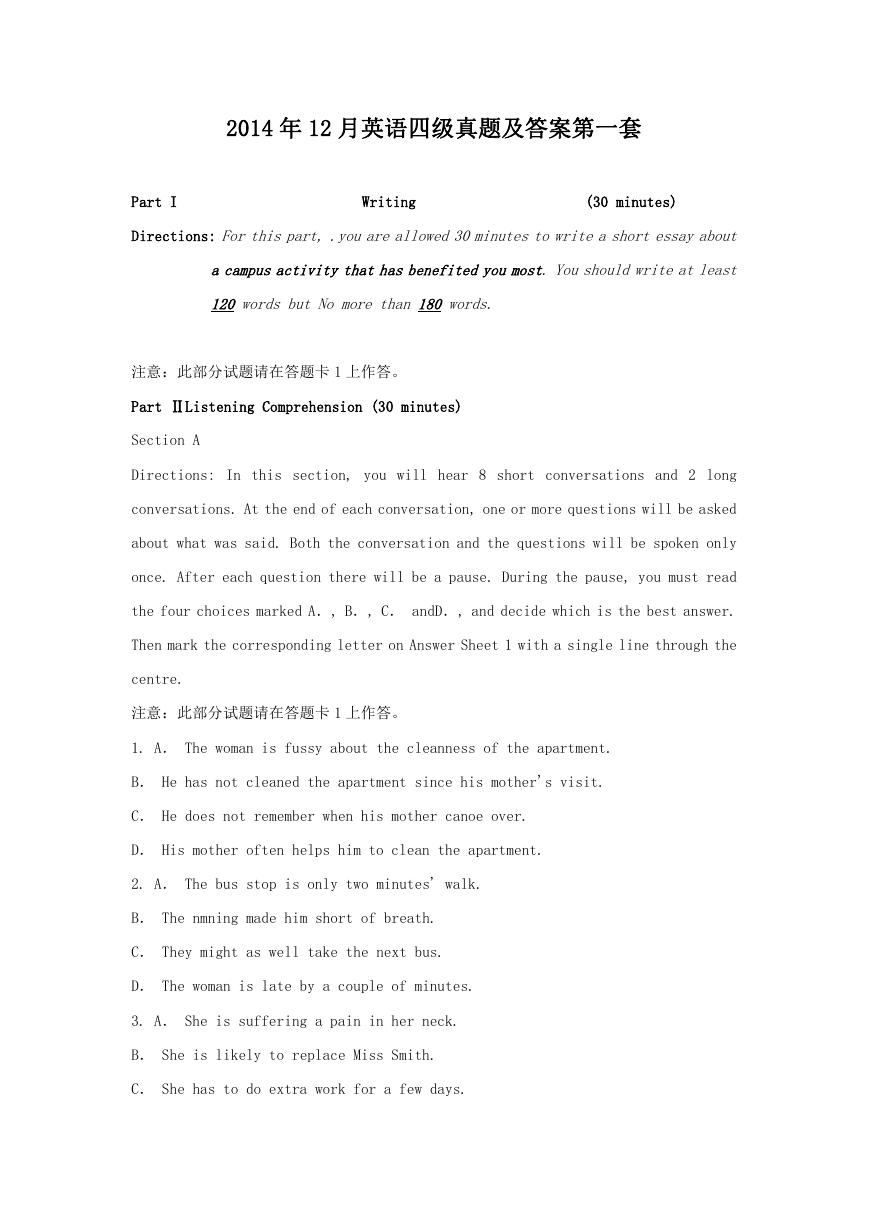
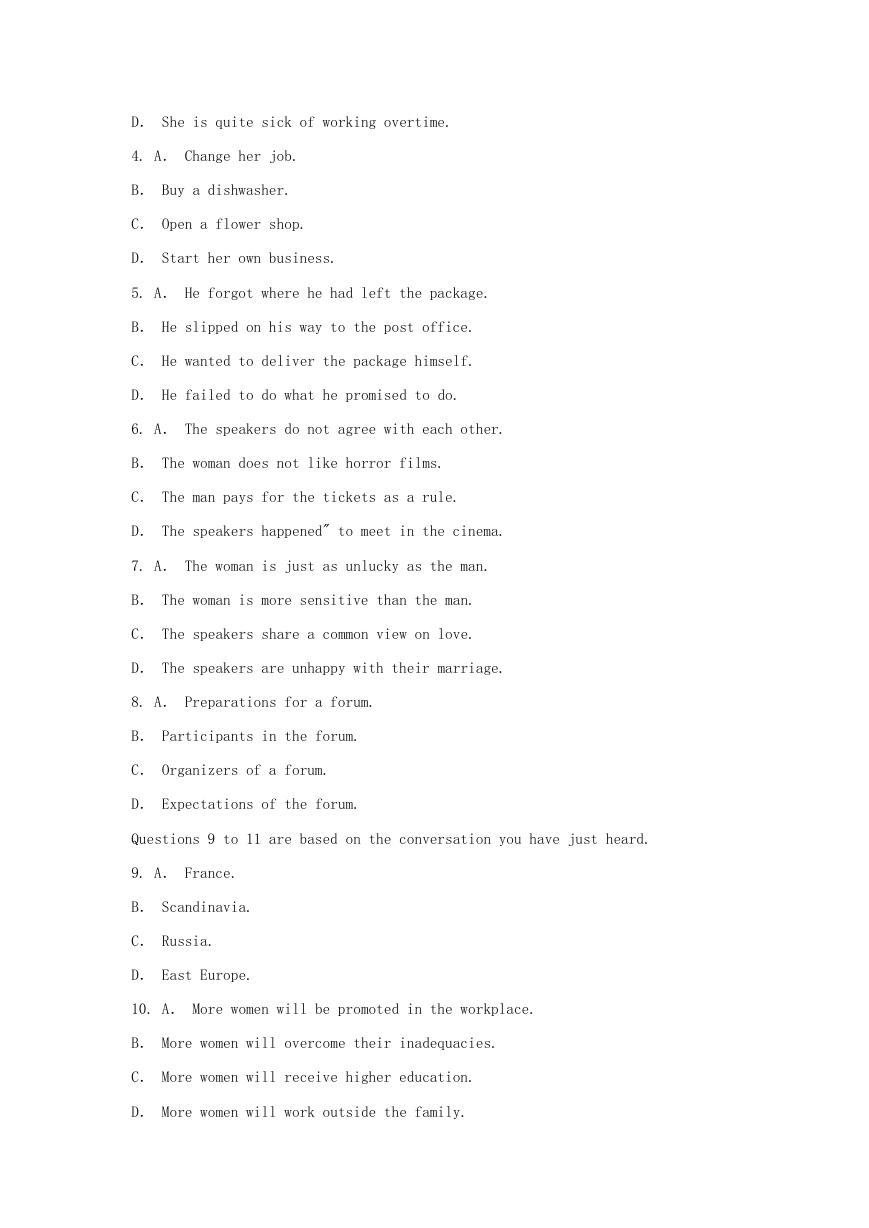

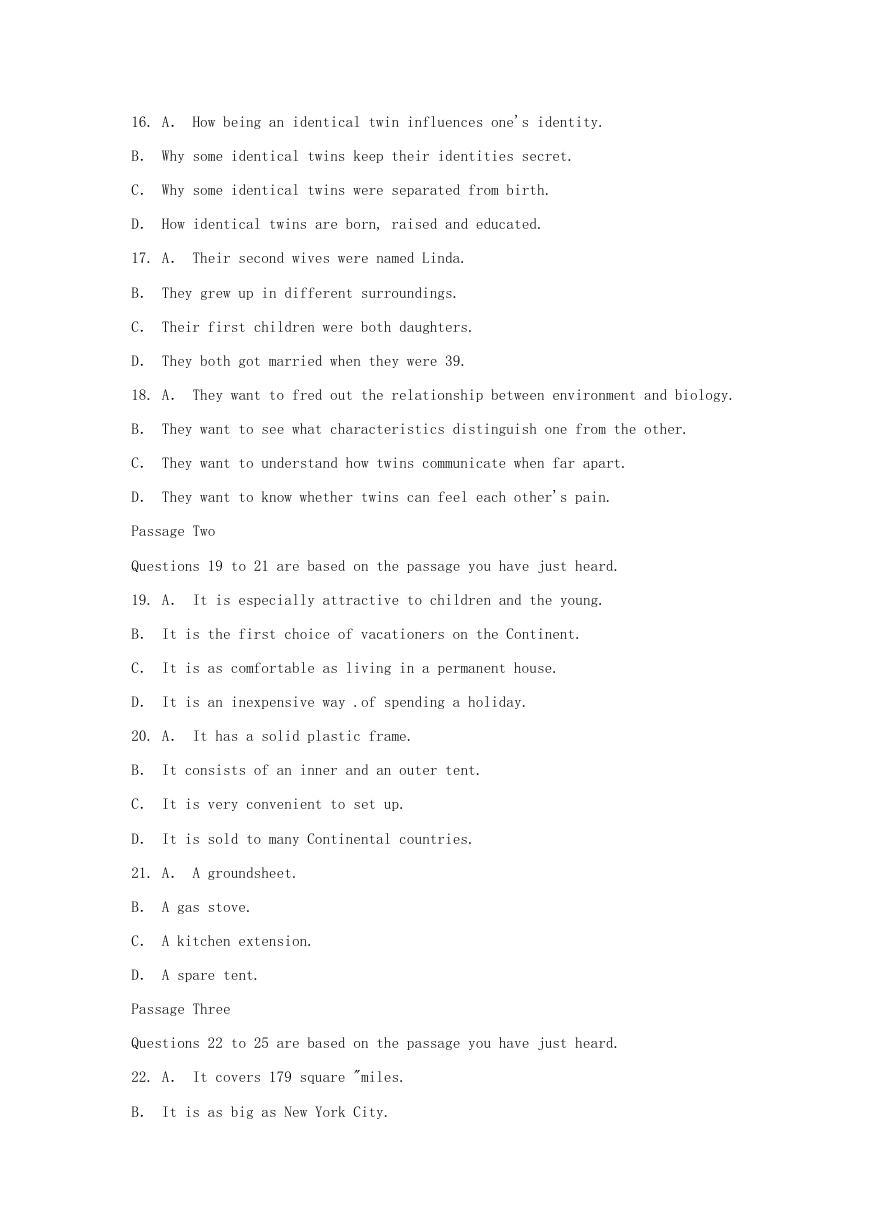
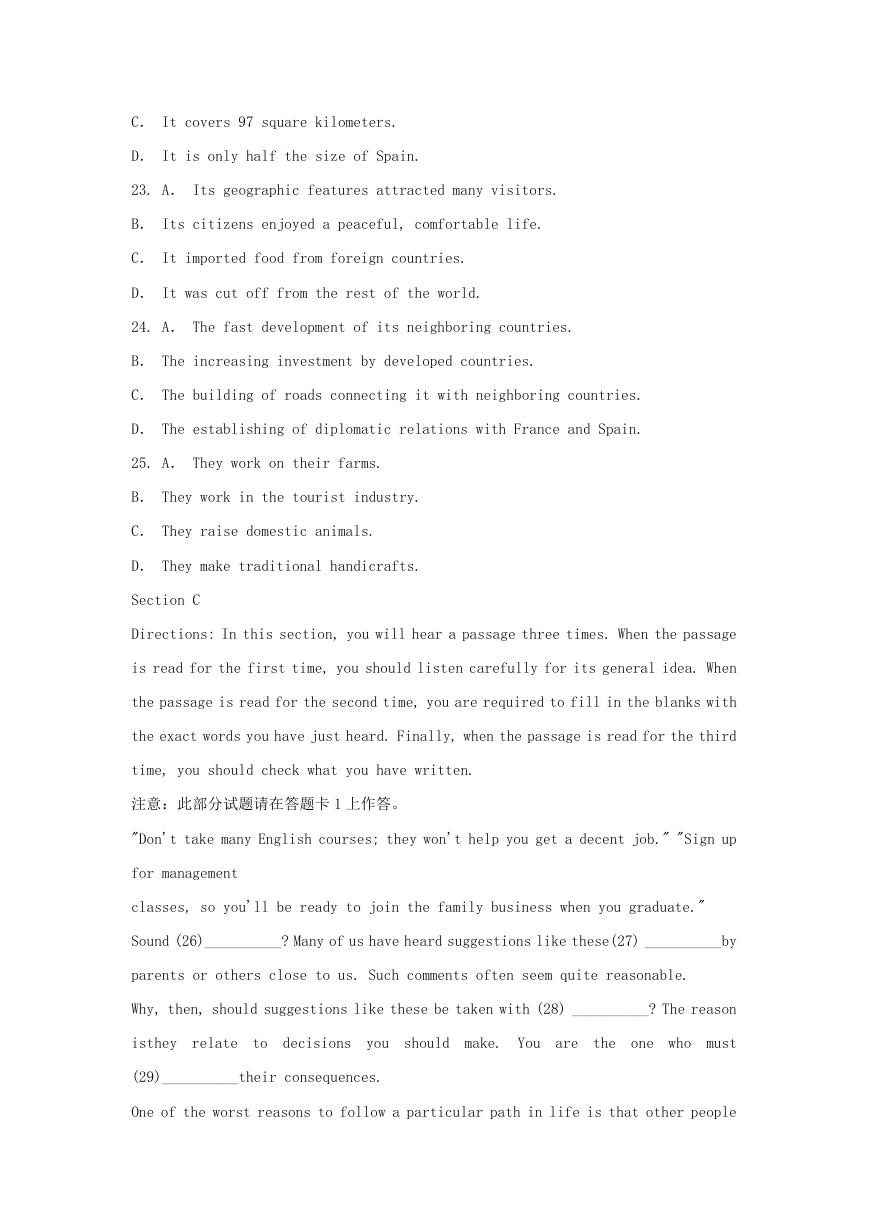
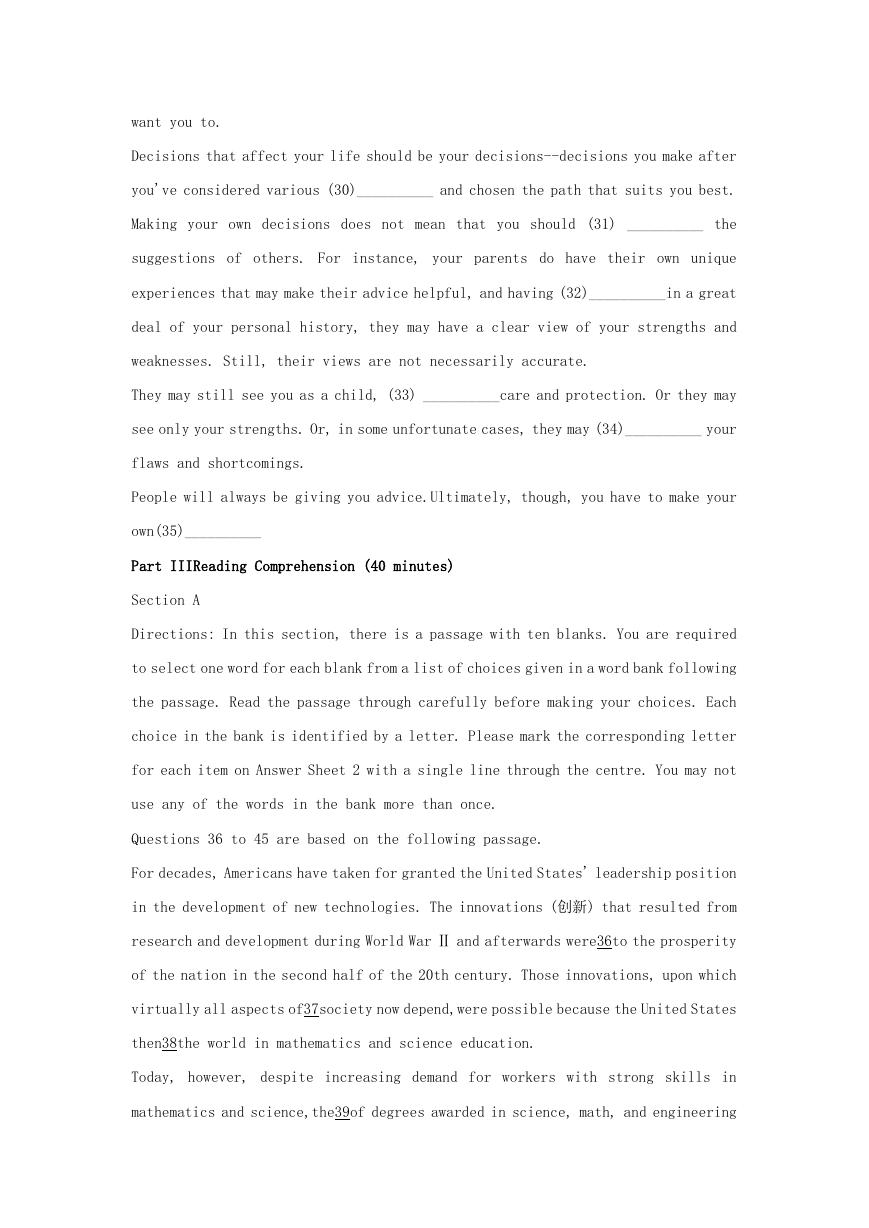
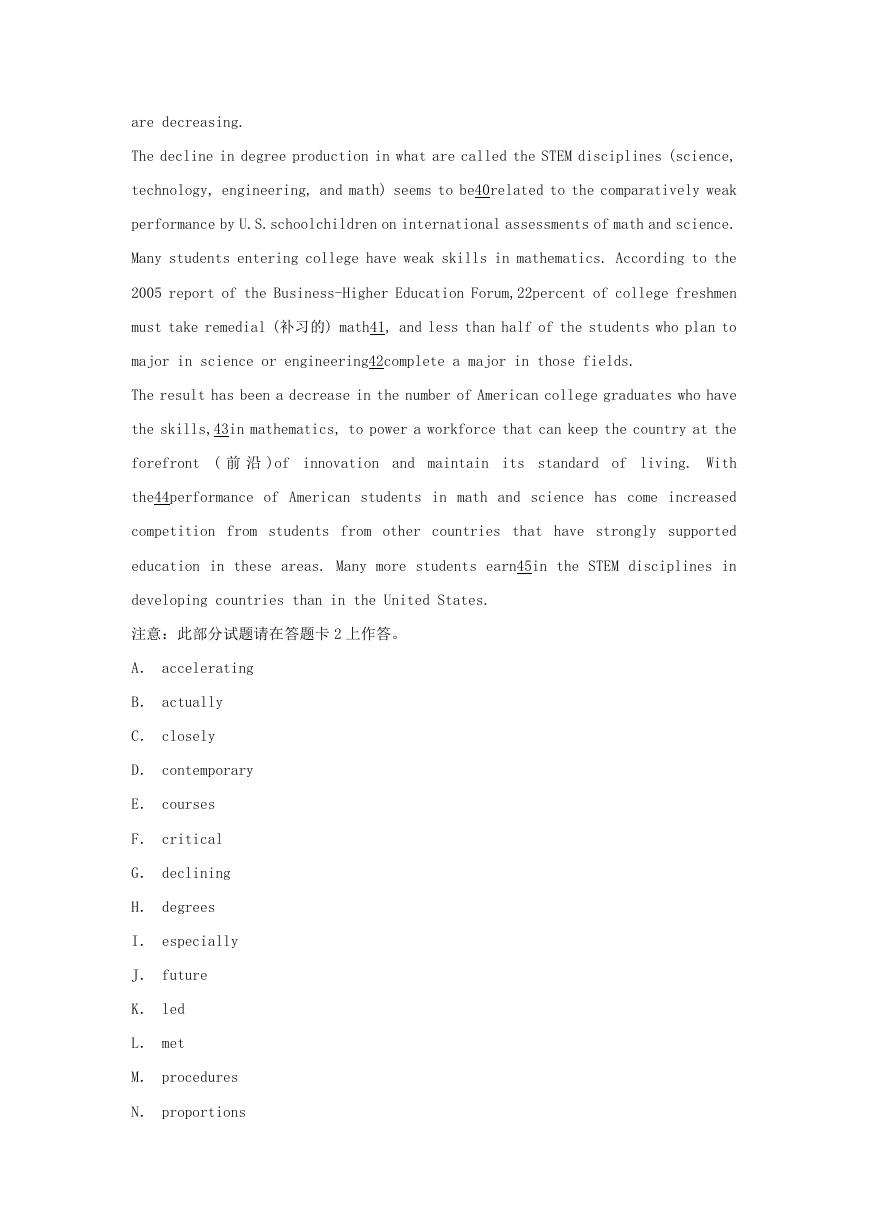
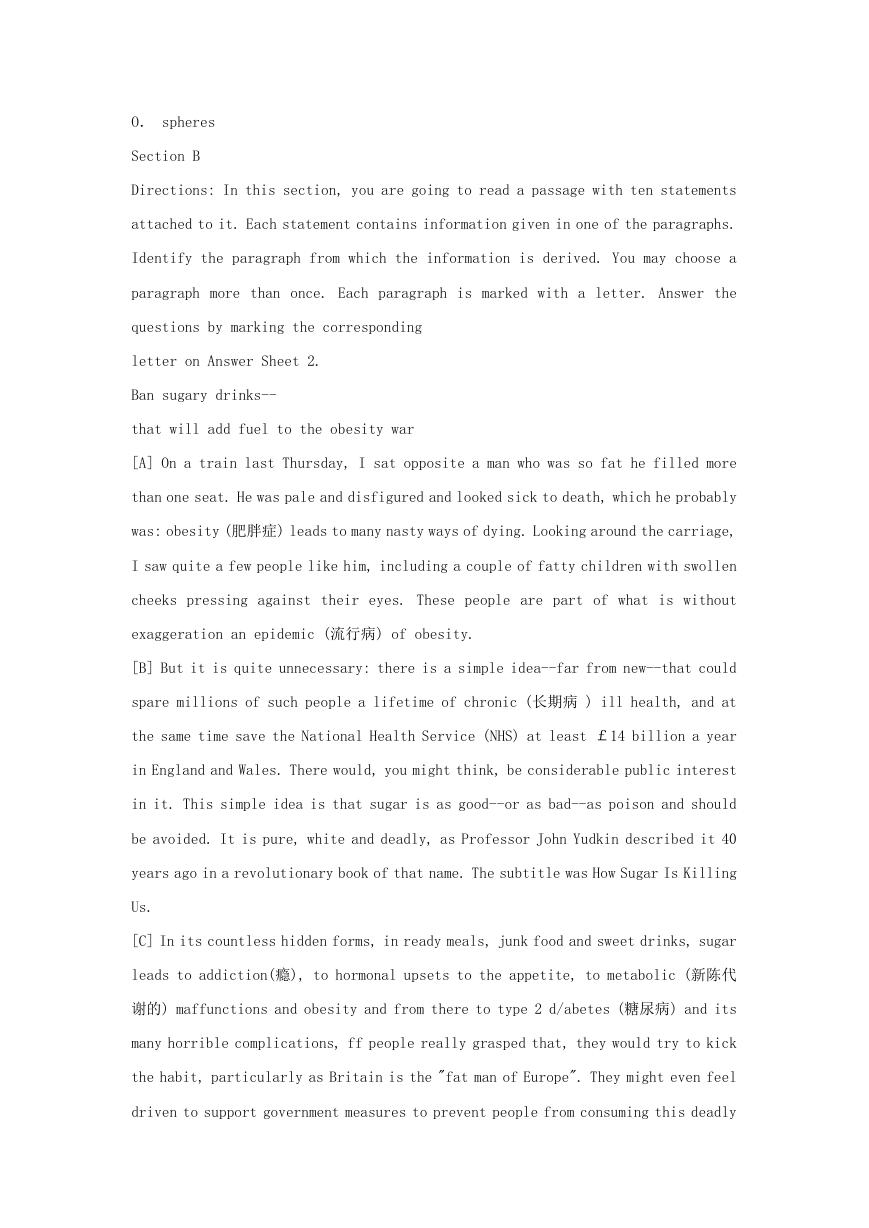








 2023年江西萍乡中考道德与法治真题及答案.doc
2023年江西萍乡中考道德与法治真题及答案.doc 2012年重庆南川中考生物真题及答案.doc
2012年重庆南川中考生物真题及答案.doc 2013年江西师范大学地理学综合及文艺理论基础考研真题.doc
2013年江西师范大学地理学综合及文艺理论基础考研真题.doc 2020年四川甘孜小升初语文真题及答案I卷.doc
2020年四川甘孜小升初语文真题及答案I卷.doc 2020年注册岩土工程师专业基础考试真题及答案.doc
2020年注册岩土工程师专业基础考试真题及答案.doc 2023-2024学年福建省厦门市九年级上学期数学月考试题及答案.doc
2023-2024学年福建省厦门市九年级上学期数学月考试题及答案.doc 2021-2022学年辽宁省沈阳市大东区九年级上学期语文期末试题及答案.doc
2021-2022学年辽宁省沈阳市大东区九年级上学期语文期末试题及答案.doc 2022-2023学年北京东城区初三第一学期物理期末试卷及答案.doc
2022-2023学年北京东城区初三第一学期物理期末试卷及答案.doc 2018上半年江西教师资格初中地理学科知识与教学能力真题及答案.doc
2018上半年江西教师资格初中地理学科知识与教学能力真题及答案.doc 2012年河北国家公务员申论考试真题及答案-省级.doc
2012年河北国家公务员申论考试真题及答案-省级.doc 2020-2021学年江苏省扬州市江都区邵樊片九年级上学期数学第一次质量检测试题及答案.doc
2020-2021学年江苏省扬州市江都区邵樊片九年级上学期数学第一次质量检测试题及答案.doc 2022下半年黑龙江教师资格证中学综合素质真题及答案.doc
2022下半年黑龙江教师资格证中学综合素质真题及答案.doc